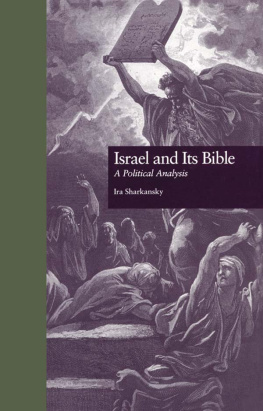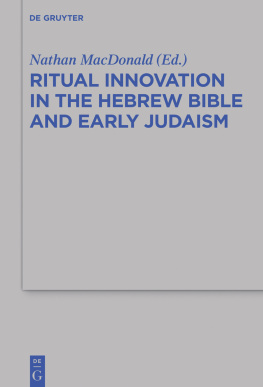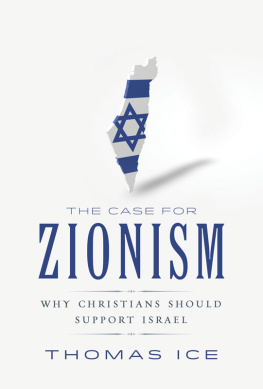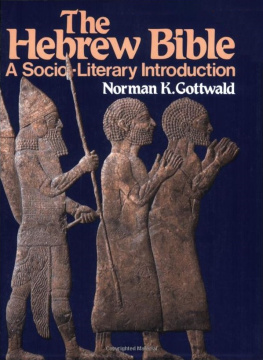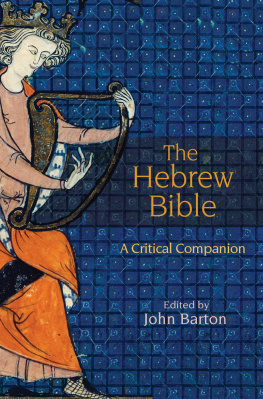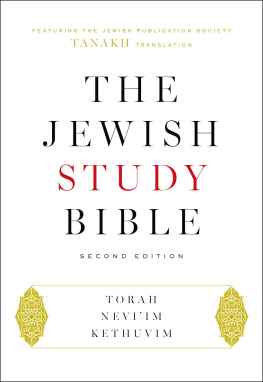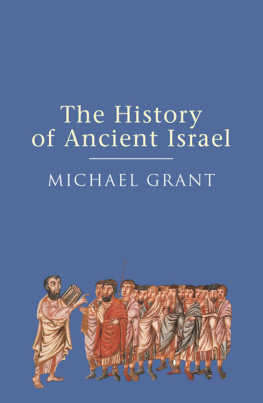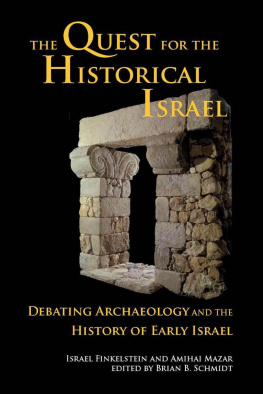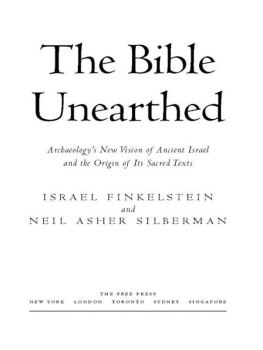First published 1996 by Garland Publishing, Inc.
This edition published 2013 by Routledge
711 Third Avenue, New York, NY 10017
2 Park Square, Milton Park, Abingdon, Oxon OX14 4RN
Routledge is an imprint of the Taylor & Francis Group, an informa business
Copyright 1996 by Ira Sharkansky
All rights reserved
Library of Congress Cataloging-in-Publication Data
Sharkansky, Ira.
Israel and its Bible : a political analysis / Ira Sharkansky.
p. cm. (Garland reference library of social science ; vol. 1031)
Includes bibliographical references and index.
ISBN 0-8153-2021-3 (alk. paper)
1. Politics in the Bible. 2. Bible. O.T.Criticism, interpretation, etc. 3. Bible. O.T.Influence. 4. Judaism20th century. 5. IsraelPolitics and government. I. Title. II. Series.
BS1199.P6S53 1996
221.6dc20 |
95-48104
CIP |
This book began its life shortly after the birth of our youngest child. We called him Mattan (gift), on account of our age, and our hope for his future. Then a Bible dictionary led me to one Mattan who was a priest of Baal slain in an episode of regime change (II Kings 11:18), and a more tantalizing story in Jeremiah 38 that mentioned another Mattan. His son was among the princes who accused the prophet of treason and sought to kill him.
It did not take long for the political character of these stories to lead me through the rest of Kings and Jeremiah and then back and forth to the whole of the Hebrew Bible and into the vast literature of commentaries and scholarship. At about the same time I began to perceive the significance of biblical work done by friends who I had known via my other interests in political science, i.e., Steven Brams, Daniel J. Elazar, and Aaron Wildavsky. An early conclusion was that the political situation of ancient Israel bore great resemblance to that of the modern country. After I wrote Ancient and Modern Israel: An Exploration of Political Parallels (State University of New York Press, 1991), I realized that I had not done justice to the numerous perspectives on politics that were apparent in the Bible and the literature about it.
Much of the Bible is written with far greater beauty than is found in modern social science. Yet its use of metaphor, allegory, poetry, allusion, and hyperbole as well as its vast breadth in historical period and existential concerns render it difficult to define its meanings in ancient contexts or its messages for the present. What one scholar wrote about Ecclesiastes is applicable to much of the Bible: My reading is not necessarily the right one, and certainly not the only possible one.1 With all of the limitations, it is my intentions to portray politically relevant episodes and themes of the Hebrew Bible that appear to shed light on the continued vitality of Judaism and the character of modern Israel. In this light I seek to develop the following themes:
The Bibles composition and compilation over perhaps a millennium reflect the development of a people with a strong sense of national identity but generally small in population, weak in economic resources and military power, and dependent on more powerful regimes that had an interest in the land the Jews considered their own.
This produced a situation of universal political relevance: a community whose aspirations were chronically greater than its achievements. The Bible reveals a skepticism about power holders as well as a sensitivity to their problems and a pragmatic willingness to adjust goals to reality.
The literary richness of the Bible has generated scholarship from the perspectives of numerous varieties of religious doctrine, secular humanism, and social science. There is much in this scholarship for its insight into the Bible and modern society, but lack of certainty is endemic to any scholarship associated with the Bible.
It is a great leap to see connections between ancient and modern cultures. This is especially the case with cultural entities as rich in their complexities as the Hebrew Bible, Judaism, and Israel. Yet the insights seem worth the risks. The disputatious character of Judaism and the noisy criticism among Israeli elites seem to emerge from roots that produced books like Job and Ecclesiastes and the prophet Jeremiah. Ancient conditions remain to reinforce these traits: i.e., weakness and dependence, aspirations that cannot be attained, along with a strong sense of communal identity, creative perceptions of alternative ways for dealing with communal security, and a willingness to argue about perceptions, visions, and plans.
Along the way to this book, I have benefited greatly from the advice and criticism of numerous Jews and non-Jews, clerics, secular scholars and others, believers, agnostics, and committed atheists. Our mutual fascination with the Bible reflects its many sides and its capacity to attract and provoke. If this book has any merit, it will attract more of the disputes that are at the heart of its enterprise. And if I have perceived the style of biblical scholarship correctly, some of the comments will be harsh.
Specialists may object to the freedom with which the substantive chapters of this book mix materials taken from different modes of scholarship. Rabbis and Christian clerics, each from their own perspective, will assert that passages in the following chapters overlook or misunderstand biblical interpretations developed in post-biblical sources. Scholars who specialize in the Bible and Jewish history may perceive that there is nothing new. Some introductory comments by C. S. Lewis to his Reflections on the Psalms may be suitable for this book as well: I am no Hebraist, no higher critic, no ancient historian, no archaeologist. I write for the unlearned about things in which I am unlearned myself.2
It is also appropriate to paraphrase the prophet Amos (Amos 7:14). I am neither a rabbi, a biblical scholar, nor even a political philosopher, nor the son of these. My perspectives are those of a political scientist with primary interests in political behavior, public policy, and public administration. This background has prepared me to focus on how the Bible describes God and humans; its proclamations, laws, and other expressions of norms indicating how they should have acted; and its reports of their failures as well as accomplishments.
AN AFTERWORD
This book went into production in September, 1995. It reached the stage of final page proofs in November, shortly after the assassination of Prime Minister Yitzhak Rabin. In the week after the assassination the Israeli media provided one extended discussion, often at an impressive intellectual level, concerned with the various individuals, groups, and social conditions that contributed to the killing, and its implications.
Hatred against the Israeli government, and especially the prime minister expressed by certain religious and nationalist Jews derived from arrangements made with the Palestinian Authority. Much of the discussion in the period following the killing dealt with the significance of the biblical Land of Israel, how much of that imprecise landscape could be bargained away to those perceived as recent terrorists for the promise of peace, and how Jews should conduct their disputes about these issues. The assassination and the soul searching that followed showed the passions that Jews can allocate to political issues with biblical roots.

